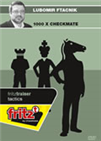This story originally appeared on ChessBase India and is republished with kind permission
The specialist of modern direct mates
Born on 6th June 1947 in Berlin, Kutzborski learnt the game of chess at the age of 12. In the beginning it was mainly because of the lack of partners who would be willing to play with him that he delved more in the chess problems section of the daily press. But this solitary curiosity quickly blossomed into a genuine passion when at 14, confined in a hospital, he read Kraemer-Zepler's famous problem collection "Im Banne des Schachproblems".
At 16 he started using his pocket money to become a regular subscriber of the German magazine "Deutsche Schachzeitung" which furthered his knowledge of problem theory.

(Left) Kraemer-Zepler's book; (right) Deutsche Schachzeitung | Photo: Amazon
Soon after this he began composing on his own, his style influenced by another brilliant strategic composer Erich Anselm Brunner. But initially he was reluctant to publish anything at all and it was not until 1964, after he got introduced to other members of the composition community in Berlin and became a regular member of their monthly meetings, that he felt comfortable presenting his work to the greater public. Herbert Grasemann tells in his book "Schach ohne Partner für Könner" (Chess without a partner, for experts) about how Berlin problemists met him for the first time; this very interesting account was translated into English by Daniel Maxwell and can be read here.

A more recent photo of Dieter Kutzborski | Photo: Martin Minski
Nevertheless, Kutzborski remained averse to titles and accolades all his life. He refused to submit his problems to the FIDE albums and therefore was never conferred with any FIDE titles of composing. This might be a reason why he is less well-known outside what is only a small circle of chess composers. He was not interested in fame but solely in his art and at that he was a master in his own right who will, for sure, live on through his immortal creations.
I will now quote some of my favourite problems composed by him. Please do work through them, I promise the labour would not be fruitless.
Problem 1
You can move the pieces on the diagram and view the solution in full below
This is a masterwork on the so called Wurzburg-Plachutta interference theme. (You can view the first move by clicking "show").
The key, 1.♘e3! (a Plachutta sacrifice) demonstrates the theme. (View the complete solution in the game viewer below.)
Problem 2
 In this extended update of the ChessBase mating course, Lubomir Ftacnik initiates you into the fine art of mating your opponent. In four videos the grandmaster explains typical mating patterns. At the same time, two small collections of material allow systematic assimilation of the subject of delivering mate. After that, it is all about answering the training questions in 1000 mating exercises.
In this extended update of the ChessBase mating course, Lubomir Ftacnik initiates you into the fine art of mating your opponent. In four videos the grandmaster explains typical mating patterns. At the same time, two small collections of material allow systematic assimilation of the subject of delivering mate. After that, it is all about answering the training questions in 1000 mating exercises.It requires imagination to solve a Kutzborski problem as this brilliant example illustrates. Imagine if there was no black pawn on g7 then?
White could have immediately registered mate with 1.Re4+ Kf8 2.Bh6#, but with the black pawn on g7 what does White do?
Well, he prepares to realize just that! First, 1.Rb4! threatening 2.Rb8#, the idea is to push the bRa7 to the last rank. The main-line now continues with 1...Ra8 2.Re4+ Kf8 3.Rf4+ Ke8 4.Bf7+ Kf8 (View the complete winning plan in the game viewer below!)
Problem 3
This is another classy gem. Need a hint?
One would like to try 1.Bb2? (threatening Bc1#) or 1.e6? (threatening Be5#) but these are refuted by 1...Qa3! & 1...Qa1! respectively. The trick lies in first driving the bQ out of the a-file and only then Bb2 followed by Bc1# will be the coup de grace! (View the complete solution in the game viewer below!)
Problem 4
This is one of his successful co-productions with Hans Peter Rehm, another exemplary German composer of modern times. When you work through the solution of this problem, do take notice of the black pawn on c4 — it is the proverbial Achilles' heel in Black's structure.
Want the first move of the solution?
1. Ne8 Threatens 2.Nd6# and forces Bb4, an important interference. (The full solution is in the game viewer below!)
Kutzborski is remembered to be a kind-hearted gentleman among his colleagues and kin.
The world of chess composition is truly bereaved at the loss of such a great genius. This article is a humble tribute to the late star and is written with the sincere hope that it will make him known to a more general audience.

(Left) Kutzborski co-authored "Logische Phantasien. Herbert Grasemann und seine Schachaufgaben" with Wolfang Dittman and Armin Geister and composed several problems in collaboration; (Right) Dieter Kutzborski - Verschlüsselte Steine by Wieland Bruch book cover| Photos: Amazon / Euroschach
There was very little biographical information available online on Kutzborski. I am grateful to the German study composer Martin Minski who helped me a lot in the compilation of this article. Hopefully I have done a decent job of it. But more can be read about him in the German book "Dieter Kutzborski - Verschlüsselte Steine" by Wieland Bruch.
Solutions
Click or tap a problem in the list to switch positions
If you enjoyed Satanick's article, feel free to like his Facebook page: The Problemist Diary
Links
























